#nra cash
Text
NRA Battlefield Vegas 1 Million Cash Sweepstakes - Enter To Win A Trip To Las Vegas
NRA Battlefield Vegas 1 Million Cash Sweepstakes – Enter To Win A Trip To Las Vegas
Interested and eligible participants can enter to NRA Battlefield Vegas 1 Million Cash Sweepstakes which provide you complete satisfaction and you will also enjoy it a lot. Sweepstakes open for all United States residents. All participants need to submit entry before July 11th, 2022 and can get a chance to Win a trip to Las Vegas.
Sweepstakes Entry Page
Sweepstakes Rules
How To Enter :
No…

View On WordPress
#Chance to Win A Trip To Las Vegas#National Rifle Association Of America Sweepstakes#NRA Battlefield Vegas 1 Million Cash Sweepstakes#nrabattlefieldvegas.org
0 notes
Text
Sister Rita, is that you?
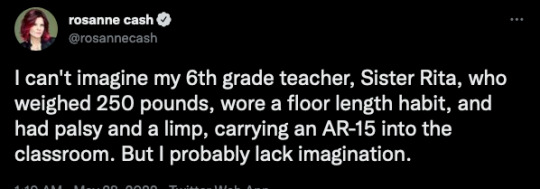
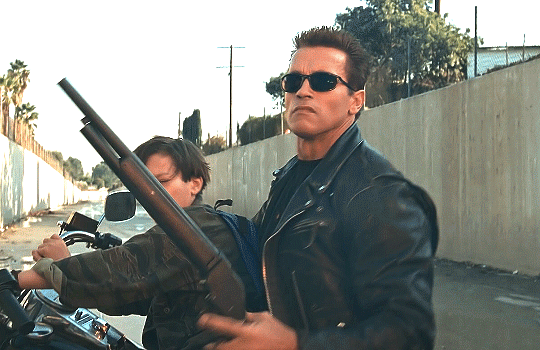
Every republican’s wet dream: Sister Rita transforms into THE TERMINATOR!
Every nra member’s rationale: arm the teachers, the nuns, the cashiers, the parking attendants, arm the doctors and nurses, arm the sports players, arm the sports fans, arm the bar tender, arm the waiter, arm the patients, arm the piano teachers, arm the kindergartens, arm the judges, arm the bakers and pastry chefs, arm lawyers, arm butchers, arm the cable technicians, arm the parents, arm the children, arm the fetuses, arm the eggs, arm the sperm, arm Jesus & the holy spirit, arm Mary, Our Lady Full of Grace... spread the love arms.
Fuck republicans and their nra blood money; fuck the nra murderers, forever.
1 note
·
View note
Text
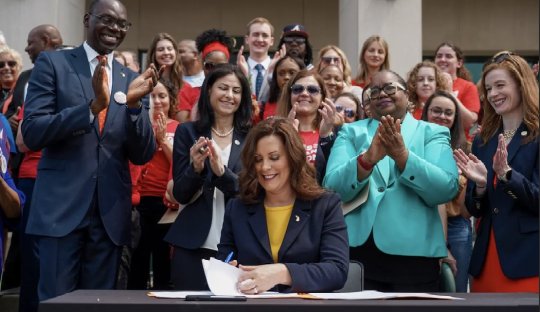
Democratic star Gov. Gretchen Whitmer of Michigan racks up another massive progressive victory as she signs a life-saving red flag law to keep guns away from those known to be a risk to themselves and others.
The new legislation — which is overwhelmingly popular despite the NRA's opposition to it — will permit law enforcement, family members, healthcare providers, and acquaintances to officially petition courts to temporarily remove firearms from anyone a judge deems an imminent threat.
"We must act because week after week in America we see grim, familiar headlines," said Whitmer. "The shooters from Oxford and MSU both showed concerning behavior beforehand."
Michigan is now one of over a dozen states with red flag laws. Since zero Republicans in the state legislature backed the bill, it will not go into effect until three months after the legislative session ends.
Once again, we see that Democrats care about stemming the bloodshed caused by guns and Republicans do not. The GOP is perfectly happy to sit back as innocent people are gunned down as long as cash from the NRA and gun manufacturers flows into their coffers.
Source: Occupy Democrats Twitter
108 notes
·
View notes
Text
This day in history

I'm on tour with my new, nationally bestselling novel The Bezzle! Catch me next weekend (Mar 30/31) in ANAHEIM at WONDERCON, then in Boston with Randall "XKCD" Munroe (Apr 11), then Providence (Apr 12), and beyond!

#20yrsago Disneyland jacks up admission at 190% of inflation https://web.archive.org/web/20040404060758/https://www.yesterland.com/tickets.html
#15yrsago British cops identify 200 schoolchildren as potential terrorists https://www.independent.co.uk/news/uk/crime/police-identify-200-children-as-potential-terrorists-1656027.html
#15yrsago Bletchley Park rebuilds the bombes — code crackers that won the war https://makezine.com/article/technology/computers-mobile/code-cracker-remade/?CMP=OTC-0D6B48984890
#15yrsago Verified by Visa: British banks phish their own customers https://web.archive.org/web/20090331094020/http://www.links.org/?p=591
#10yrsago Motion picture industry continues to stagger under piracy with mere record-breaking income https://arstechnica.com/tech-policy/2014/03/piracy-notwithstanding-mpaa-enjoys-a-very-strong-year-again/
#10yrsago Sen Lamar Alexander: if shills have to tell Congress who’s paying them, it will “chill speech” https://www.thedailybeast.com/the-republican-street-fight-over-transparency-in-government
#10yrsago Ethiopia: the first “off-the-shelf” surveillance state https://www.hrw.org/report/2014/03/25/they-know-everything-we-do/telecom-and-internet-surveillance-ethiopia
#5yrsago How hedge funds, Goldman Sachs, and corrupt executives used Gymboree’s chaotic bankruptcy to cash out while destroying the careers of loyal employees https://theintercept.com/2019/03/25/gymboree-bankruptcy-severance-scam/
#5yrsago Study finds 95% of all Bitcoin trading volume is fake, designed to lure in ICOs https://web.archive.org/web/20190401033546/https://go.technologyreview.com/134-fake-bitcoin-trading
#5yrsago Sting operation: the NRA explains to white nationalist Australian political party how to deflect gun control calls after a massacre https://www.aljazeera.com/news/2019/3/26/how-to-sell-a-massacre-nras-playbook-revealed
#5yrsago Millennials are killing McMansions https://web.archive.org/web/20190920074507/https://www.businessinsider.com.au/millennials-vs-baby-boomers-big-houses-real-estate-market-problems-2019-3
#1yrago What comes after neoliberalism? https://pluralistic.net/2023/03/28/imagine-a-horse/#perfectly-spherical-cows-of-uniform-density-on-a-frictionless-plane
5 notes
·
View notes
Text
Not to continue to sound like a communist, but:
"In 2021, as childcare costs soared by more than 40%, Congress provided a massive cash infusion to states to stabilize childcare and supplied parents with both cash and an additional tax refund to support their kids. Seemingly overnight, child poverty dropped by 40%."
Those measly little pandemic checks that gave us back a teeny bit of our own tax money DROPPED CHILD POVERTY BY 40%.
"Among 38 leading Western nations, American kids account for 97% of child gun deaths."
These same assjackets who disgustingly whine about "a domestic supply of babies" as if people with uteruses are a herd of things for them to breed also allow our children to be treated like they're disposable so they can keep collecting NRA handouts.
I'm fed up with this oligarchy. I'm fed up with living in the fucking Hunger Games. Hey France, can we borrow your guillotine?
3 notes
·
View notes
Photo
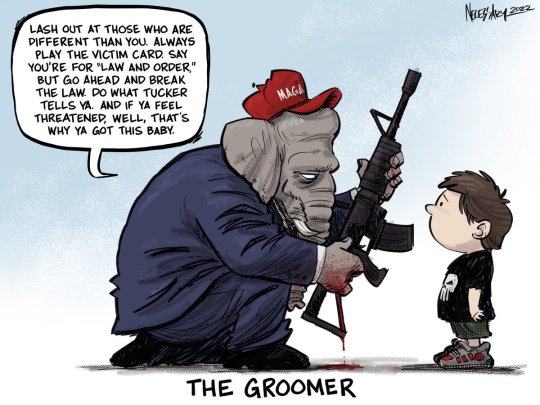
LETTERS FROM AN AMERICAN
May 6, 2023
HEATHER COX RICHARDSON
MAY 6, 2023
For years now, after one massacre or another, I have written some version of the same article, explaining that the nation’s current gun free-for-all is not traditional but, rather, is a symptom of the takeover of our nation by a radical extremist minority. The idea that massacres are “the price of freedom,” as right-wing personality Bill O’Reilly said in 2017 after the Mandalay Bay massacre in Las Vegas, in which a gunman killed 60 people and wounded 411 others, is new, and it is about politics, not our history.
The Second Amendment to the Constitution, on which modern-day arguments for widespread gun ownership rest, is one simple sentence: “A well regulated militia, being necessary for the security of a free state, the right of the people to keep and bear arms, shall not be infringed.” There’s not a lot to go on about what the Framers meant, although in their day, to “bear arms” meant to be part of an organized militia.
As the Tennessee Supreme Court wrote in 1840, “A man in the pursuit of deer, elk, and buffaloes might carry his rifle every day for forty years, and yet it would never be said of him that he had borne arms; much less could it be said that a private citizen bears arms because he has a dirk or pistol concealed under his clothes, or a spear in a cane.”
Today’s insistence that the Second Amendment gives individuals a broad right to own guns comes from two places.
One is the establishment of the National Rifle Association in New York in 1871, in part to improve the marksmanship skills of American citizens who might be called on to fight in another war, and in part to promote in America the British sport of elite shooting, complete with hefty cash prizes in newly organized tournaments. Just a decade after the Civil War, veterans jumped at the chance to hone their former skills. Rifle clubs sprang up across the nation.
By the 1920s, rifle shooting was a popular American sport. “Riflemen” competed in the Olympics, in colleges, and in local, state, and national tournaments organized by the NRA. Being a good marksman was a source of pride, mentioned in public biographies, like being a good golfer. In 1925, when the secretary of the NRA apparently took money from ammunition and arms manufacturers, the organization tossed him out and sued him.
NRA officers insisted on the right of citizens to own rifles and handguns but worked hard to distinguish between law-abiding citizens who should have access to guns for hunting and target shooting and protection, and criminals and mentally ill people, who should not. In 1931, amid fears of bootlegger gangs, the NRA backed federal legislation to limit concealed weapons; prevent possession by criminals, the mentally ill and children; to require all dealers to be licensed; and to require background checks before delivery. It backed the 1934 National Firearms Act, and parts of the 1968 Gun Control Act, designed to stop what seemed to be America’s hurtle toward violence in that turbulent decade.
But in the mid-1970s a faction in the NRA forced the organization away from sports and toward opposing “gun control.” It formed a political action committee (PAC) in 1975, and two years later it elected an organization president who abandoned sporting culture and focused instead on “gun rights.”
This was the second thing that led us to where we are today: leaders of the NRA embraced the politics of Movement Conservatism, the political movement that rose to combat the business regulations and social welfare programs that both Democrats and Republicans embraced after World War II.
Movement Conservatives embraced the myth of the American cowboy as a white man standing against the “socialism” of the federal government as it sought to level the economic playing field between Black Americans and their white neighbors.
Leaders like Arizona Senator Barry Goldwater personified the American cowboy, with his cowboy hat and opposition to government regulation, while television Westerns showed good guys putting down bad guys without the interference of the government.
In 1972 the Republican platform had called for gun control to restrict the sale of “cheap handguns,” but in 1975, as he geared up to challenge President Gerald R. Ford for the 1976 presidential nomination, Movement Conservative hero Ronald Reagan took a stand against gun control. In 1980, the Republican platform opposed the federal registration of firearms, and the NRA endorsed a presidential candidate—Reagan—for the first time.
When President Reagan took office, a new American era, dominated by Movement Conservatives, began. And the power of the NRA over American politics grew.
In 1981 a gunman trying to kill Reagan shot and paralyzed his press secretary, James Brady, and wounded Secret Service agent Tim McCarthy and police officer Thomas Delahanty. After the shooting, then-representative Charles Schumer (D-NY) introduced legislation that became known as the Brady Handgun Violence Prevention Act, or the Brady Bill, to require background checks before gun purchases. Reagan, who was a member of the NRA, endorsed the bill, but the NRA spent millions of dollars to defeat it.
After the Brady Bill passed in 1993, the NRA paid for lawsuits in nine states to strike it down. Until 1959, every single legal article on the Second Amendment concluded that it was not intended to guarantee individuals the right to own a gun. But in the 1970s, legal scholars funded by the NRA had begun to argue that the Second Amendment did exactly that.
In 1997, when the Brady Bill cases came before the Supreme Court as Printz v. United States, the Supreme Court declared parts of the measure unconstitutional.
Now a player in national politics, the NRA was awash in money from gun and ammunition manufacturers. By 2000 it was one of the three most powerful lobbies in Washington. It spent more than $40 million on the 2008 election. In that year, the landmark Supreme Court decision of District of Columbia v. Heller struck down gun regulations and declared that the Second Amendment protects an individual’s right to keep and bear arms.
Increasingly, NRA money backed Republican candidates. In 2012 the NRA spent $9 million in the presidential election, and in 2014 it spent $13 million. Then, in 2016, it spent over $50 million on Republican candidates, including more than $30 million on Trump’s effort to win the White House. This money was vital to Trump, since many other Republican super PACs refused to back him. The NRA spent more money on Trump than any other outside group, including the leading Trump super PAC, which spent $20.3 million.
The unfettered right to own and carry weapons has come to symbolize the Republican Party’s ideology of individual liberty. Lawmakers and activists have not been able to overcome Republican insistence on gun rights despite the mass shootings that have risen since their new emphasis on guns.
Tonight, I am, once again, posting yet another version of this article.
—
LETTERS FROM AN AMERICAN
HEATHER COX RICHARDSON
#Heather Cox Richardson#Letters From An American#gun violence#right wing propaganda#NRA#history#Corrupt SCOTUS#money in politics#guns#Brady Bill#gun control
12 notes
·
View notes
Note
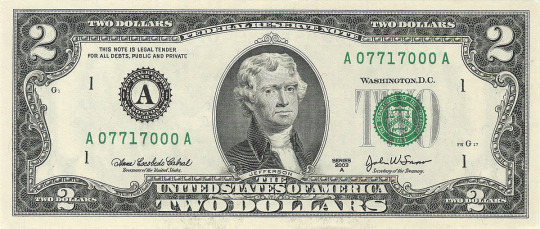
donation
When i was working as a child tending the cash register an old man gave us a two dollar bill but on the back had da vinci’s last supper on it as a joke and he laughed and laughed at how stupid i was for nervously accepting it. Im pretty sure he gave all the children free NRA hats later on idk. He did pay for his sloppy joe with real money.
3 notes
·
View notes
Text
The quadruple ruling coalition is planning a controversial incentive to increase tax and social security collection. The government proposes that from 2023 a bonus be introduced for every citizen and company that has helped the tax authorities with information to establish hidden taxes and social security contributions. The bonus will be 10% of the additional income entered into the treasury thanks to the signal.
To make this happen, the government will amend the Tax and Social Security Procedure Code, which regulates the procedure for establishing tax liabilities. According to experts, the measure is very controversial and could lead to legal chaos, harassment and blocking of the tax administration
The proposal for payment of 10% of the additional revenues established on the signals of citizens and companies is written in the package of anti-crisis measures. The details of the implementation of such an incentive are still unclear, and can only be expected in the autumn with the introduction of the regular package of tax laws with the preparation of the 2023 budget. However, according to experts, the measure is extremely problematic and could block the work of the administration, lead to false signals and incite citizens and companies.
At the moment, the tax authorities accept signals for tax and social security violations, if they are submitted in compliance with the rules of the Administrative Procedure Code. The Code allows proceedings to be instituted only if the alert is not anonymous and concerns violations committed in the last two years. The establishment of additional obligations itself takes place after an audit, which is assigned by an explicit order, and the audit act, in case obligations are established, must enter into force. Possible payment of part of the findings may be only after this stage, experts say.
The main risk in introducing such an incentive is the mass submission of signals and the blocking of the tax administration. Currently, the NRA performs inspections and audits according to specific algorithms. The tax authorities carry out regular checks on set-off and refund, which concern mass VAT, checks for comparison of income with property, annual and thematic checks of various risk groups. In 2021, for example, according to the tax report, there were inspections of persons with significant inventories reported on the background of the activity, inspections of individuals who acquired expensive properties in a certain price range, cash checks, inspections of individuals with real estate in Dubai, audits of expensive car owners, gambling law inspections. Control was performed in commercial sites, etc. In performing this control activity, profiles and behavior, degree of risk and other indicators are analyzed. It is not clear whether the new signaling mechanism will set any thresholds of significance so as not to flood the administration with small signals.
It is clear from the report of the National Revenue Agency that for 2021 the tax authorities have established BGN 916,068,000 million in additional liabilities after audits, as BGN 11.3 million are the additional contributions established. 33% of the audit acts have been appealed.
For the time being, the social partners are refraining from commenting on the measure precisely because of the lack of clarity. "We cannot express a specific opinion, as there is no clarity about the mechanism and procedure by which it will be applied, what kind of publicity is expected, the existing variable duration of the process of issuing a revision act and its possible appeal", is the opinion of BIA.
6 notes
·
View notes
Text
'The NRA today is in a dismal state' as cash dries up and they plunge 'deep into the red' - Raw Story
0 notes
Text
In fact, in large part because of the way anxieties about his gun policies have been manipulated, the Obama era has been a golden age for firearms manufacturers, and the run-up to Election 2012 could be for Glock and Remington what the Christmas shopping season is for Macy’s and Sears: a time to cash in before the narrative changes.
0 notes
Text
October 26, 2023 (Thursday)
Today, data from the Commerce Department showed that the U.S. economy grew at an astonishing rate of 4.9% in the third quarter, and we learned that in Lewiston, Maine, a single shooter killed at least 18 people—more people than died by gun homicide in Maine in the whole of 2021—and injured at least 13 others.
These two things are the results of two dramatically different worldviews.
President Joe Biden, Vice President Kamala Harris, Treasury Secretary Janet Yellen, and the administration’s other economic advisors have resurrected the idea that the government can promote economic growth by regulating businesses, protecting workers, and investing in ordinary Americans.
That theory reaches back to the liberal consensus of the years from 1933 to 1981, when members of both parties believed that the intricacies of the modern economy required the federal government to keep the playing field level so that a few people could not monopolize resources and power, cutting others out. In those years, Americans used the government to regulate business, provide a basic social safety net, promote infrastructure, and protect civil rights. The system created what economists call the “great compression.” Wealth and income distribution became much more even, and economic inequality fell dramatically. The economy boomed.
The modern-day Republican Party grew out of a rejection of that idea. In the 1950s and 1960s, a faction insisted that such government action was a form of socialism that stopped the economy from responding efficiently to market forces. Individual entrepreneurs should invest their money without government interference, they argued, and their investments would dramatically expand the economy. Putting money at the “supply side” rather than the “demand side” would allow everyone to prosper together, they promised: a rising tide would lift all boats. They vowed to cut taxes and regulations and to restore American individualism.
Those same people championed the image of the American cowboy as the symbol of the country: a man who wanted nothing from the government but to be left alone to work hard and prosper, and who protected himself and his family—if he had one—with a gun.
That image was always a myth, but it was an attractive one to white voters who had come to resent the government’s protection of civil rights, those voters who listened to politicians who assured them that the government’s actions were simply a way to direct tax dollars into the pockets of undeserving minorities.
The political image of cowboy individualism played into the hands of the National Rifle Association, which had organized in 1871 in New York in part to improve the marksmanship skills of American citizens who might be called on to fight in another war, and in part to promote in America the British sport of elite shooting, complete with quite hefty cash prizes in newly organized tournaments.
By 1920, rifle shooting was a popular American sport, and the NRA worked hard to keep it respectable. In the 1930s the NRA backed federal legislation to limit concealed weapons; prevent possession by criminals, the mentally ill, and children; require all dealers to be licensed, and require background checks before delivery. The NRA backed the 1934 National Firearms Act and parts of the 1968 Gun Control Act, designed to stop what seemed to be America’s hurtle toward violence in that turbulent decade.
But in the 1970s, a faction in the NRA forced the organization away from sports and toward opposing “gun control.” The NRA formed a political action committee (PAC) in 1975, and in 1980, for the first time, it endorsed a presidential candidate: Republican Ronald Reagan. When Reagan was elected, the NRA became a player in national politics and was awash in money from gun and ammunition manufacturers.
By 2000 the NRA was one of the three most powerful lobbies in Washington. In 2004 the federal assault weapons ban expired, and gun companies began to sell AR-15–style semiautomatic rifles (the AR stands for “ArmaLite Rifle,” which was the name of the military weapon on which the mass-market AR-15 is based). Gun sales had been flat for years, but gun and ammunition sales took off during the administration of Democratic president Barack Obama as advocates told customers that he would confiscate their guns.
Firearms companies played on the politics of the era, advertising their products as tools for heroic figures taking on dangerous threats in society. The firearms industry estimates that about 20 million AR-15s have been sold in the U.S., and mass shootings took off as individual rights trumped the rights of the community.
The NRA spent more than $204 million on the 2008 election. In 2016, NRA spending surged to more than $419 million, with more than $30 million going to support Trump. Since 2020, lawsuits and a dramatic dropoff in funding have dramatically weakened the NRA, but the image of the gun-toting individualist has become so central to the Republican Party that congress members have taken to sending holiday cards showing their families brandishing assault rifles and to wearing AR-15 lapel pins on the floor of Congress.
But now, as the nation reels from another mass shooting, there is yet more proof that Republican economic individualism from which the gun obsession developed doesn’t work as well as the idea of using the government to support the American people. Growth under the Trump administration before the Covid-19 pandemic hit was 2.5%. Trump promised he would get it to 3%, which he claimed was an astonishing rate.
Despite the dire warnings that the economic policies of the Biden administration would cause a terrible recession, Biden and Harris rejected supply-side policies and stood firm on the traditional idea that trying to hold the economic playing field level and investing in workers and infrastructure would nurture the economy. The economy has responded exactly as they predicted, giving the U.S. strong growth for the past five quarters.
Manufacturing has taken off, and the rate of job growth is historic. At the same time, new bargaining power has helped workers make dramatic gains: yesterday the United Auto Workers union and Ford reached a tentative agreement that includes a 25% wage increase over the next 4.5 years, along with cost-of-living adjustments that will bring the increases up to 33%. The union still has to ratify the agreement, but the UAW has called off the strike at Ford plants, suggesting it has faith the union will agree.
A worldview that requires the government to work for the people, rather than handing power to individuals to impose their will on the majority, supports the idea of gun safety laws. Such laws are very popular: in April 2023 a Fox News poll showed that at least 80% of Americans want criminal background checks on gun buyers, better enforcement of existing gun laws, a 21-year age requirement for gun purchases, and mental health checks on gun buyers. Seventy-seven percent wanted a 30-day waiting period to buy a gun; 61% wanted to ban assault rifles and semiautomatic weapons.
Those eager to dismantle the government have stood in the way of such measures, but the heartbreaking news out of Maine has changed at least one lawmaker’s stand. Representative Jared Golden (D-ME), who represents Maine’s conservative second district, which includes Lewiston, today apologized for his previous opposition to gun safety laws.
“The time has now come for me to take responsibility for this failure, which is why I now call on the United States Congress to ban assault rifles like the one used by this sick perpetrator of this mass killing," Golden said. "To the families who lost loved ones and to those who have been harmed, I ask forgiveness and support as I seek to put an end to these terrible shootings.”
Maine governor Janet Mills has personal ties to Lewiston, where she worked, met her late husband, and sent their daughters to school. “Lewiston is a special place,” she wrote today. “It is a closeknit community with a long history of hard work, of persistence, of faith, of opening its big heart to people everywhere.
“I love this place, just as I love our whole state with my entire heart. I am so deeply saddened. This city did not deserve this terrible assault on its citizens, on its peace of mind, on its sense of security. No city does. No state. No people.”
0 notes
Text
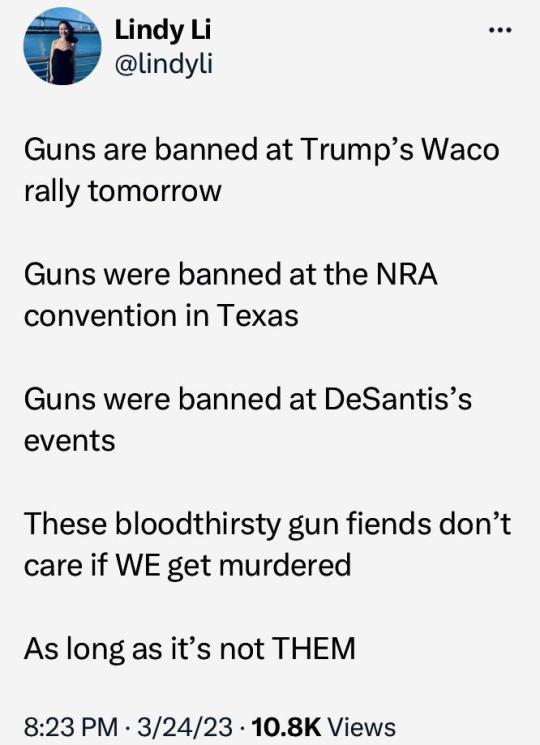
Totally cool with drowning our schools, churches, supermarkets, movie theaters, neighborhoods, workplaces, streets with guns. Totally cool was cashing big fat checks from the NRA and gunmakers. As long as they’re not the ones doing the dying.
86 notes
·
View notes
Text
The Smart Trick of The US Arab Chamber of Commerce
The stamp of USACC is famous in the Arab nations, even so, to validate our stamp, just style the stamp selection from the validation box located on the Best of the House web page.
Rather, it workout routines for judicial supervision of arbitration proceedings. Its obligations range from checking the arbitral course of action to altering expenses and improvements and confirming and appointing arbitrators.
An e-mail message made up of Recommendations regarding how to reset your password has been dispatched to the e-mail deal shown in your account.
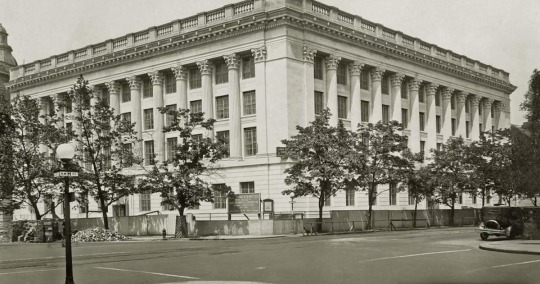
Gatherings: Platinum members receive complimentary use of and VIP seating on the least NUSACC occasions, which includes Those people with U.S. decision-makers and Arab dignitaries.
So, on this Arab American Heritage Month, I want to precise my proper needs and gratitude for all that you do for making our country more powerful and much better.
Understanding the National or International need for comprehension information is The crucial element of assistance that these levels of chambers of commerce present. These expert services are typically at no fee or cost to their users, many of the means offer you individual and/or company expert services which will have an incredibly minimal rate (Memberships to other Affiliation similar to the NRA, etc.).
Why aren’t our stories staying informed? What’s the dark drive that’s preserving us from hearing our voice?
Titles on Wikipedia are situations delicate aside from the main character; remember to Examine choice capitalizations and contemplate incorporating a redirect right here to the proper title.
Operate Grow Our best expert tips on how to mature your company — from attracting new consumers to retaining current consumers happy and obtaining the cash to do it.
The country’s Arab citizens? They ended up dealt much more home demolitions within the Negev, continued application of the Kamenitz Legislation (which cracked down on construction while in the Arab Local community) and repression within the occupied territories.
Federal investigators deploy to Maui to assist with fireplace probe Bryan Kohberger's attorney's concern validity of knife sheath DNA University's beginning — but a lot of districts deficiency more than enough bus drivers Blue light blocking Eyeglasses might not enable eye strain, researchers locate Trump PAC foots the Monthly bill for private eye in Manhattan circumstances.
The US Arab Chamber of Commerce's mission is to dedicate itself to supplying Arab companies with outstanding chamber of commerce benefits, high-good quality, appropriate suggestions, and solutions that have the ability to improve their growth and growth in the present financial system. Immediately after we had labored incredibly closely with the US Arabian Missions in the Arab Environment and Arab Embassies and Consulates, we experienced designed our Concepts and still supplying our greatest to facilitate the business enterprise communication and cooperation suggests.
Therefore, NUSACC is really a “sister chamber” and lover of the national chambers of commerce throughout the Arab entire world.
NUSACC recently received the President’s “E” Award for Export Provider. While various chambers of commerce have won the “E” Award over time, This is certainly The very first time in the fifty-nine-calendar year record on the award that it went to a chamber that is dedicated to U.
0 notes
Text
May 6, 2023 (Saturday)
For years now, after one massacre or another, I have written some version of the same article, explaining that the nation’s current gun free-for-all is not traditional but, rather, is a symptom of the takeover of our nation by a radical extremist minority. The idea that massacres are “the price of freedom,” as right-wing personality Bill O’Reilly said in 2017 after the Mandalay Bay massacre in Las Vegas, in which a gunman killed 60 people and wounded 411 others, is new, and it is about politics, not our history.
The Second Amendment to the Constitution, on which modern-day arguments for widespread gun ownership rest, is one simple sentence: “A well regulated militia, being necessary for the security of a free state, the right of the people to keep and bear arms, shall not be infringed.” There’s not a lot to go on about what the Framers meant, although in their day, to “bear arms” meant to be part of an organized militia.
As the Tennessee Supreme Court wrote in 1840, “A man in the pursuit of deer, elk, and buffaloes might carry his rifle every day for forty years, and yet it would never be said of him that he had borne arms; much less could it be said that a private citizen bears arms because he has a dirk or pistol concealed under his clothes, or a spear in a cane.”
Today’s insistence that the Second Amendment gives individuals a broad right to own guns comes from two places.
One is the establishment of the National Rifle Association in New York in 1871, in part to improve the marksmanship skills of American citizens who might be called on to fight in another war, and in part to promote in America the British sport of elite shooting, complete with hefty cash prizes in newly organized tournaments. Just a decade after the Civil War, veterans jumped at the chance to hone their former skills. Rifle clubs sprang up across the nation.
By the 1920s, rifle shooting was a popular American sport. “Riflemen” competed in the Olympics, in colleges, and in local, state, and national tournaments organized by the NRA. Being a good marksman was a source of pride, mentioned in public biographies, like being a good golfer. In 1925, when the secretary of the NRA apparently took money from ammunition and arms manufacturers, the organization tossed him out and sued him.
NRA officers insisted on the right of citizens to own rifles and handguns but worked hard to distinguish between law-abiding citizens who should have access to guns for hunting and target shooting and protection, and criminals and mentally ill people, who should not. In 1931, amid fears of bootlegger gangs, the NRA backed federal legislation to limit concealed weapons; prevent possession by criminals, the mentally ill and children; to require all dealers to be licensed; and to require background checks before delivery. It backed the 1934 National Firearms Act, and parts of the 1968 Gun Control Act, designed to stop what seemed to be America’s hurtle toward violence in that turbulent decade.
But in the mid-1970s a faction in the NRA forced the organization away from sports and toward opposing “gun control.” It formed a political action committee (PAC) in 1975, and two years later it elected an organization president who abandoned sporting culture and focused instead on “gun rights.”
This was the second thing that led us to where we are today: leaders of the NRA embraced the politics of Movement Conservatism, the political movement that rose to combat the business regulations and social welfare programs that both Democrats and Republicans embraced after World War II.
Movement Conservatives embraced the myth of the American cowboy as a white man standing against the “socialism” of the federal government as it sought to level the economic playing field between Black Americans and their white neighbors.
Leaders like Arizona Senator Barry Goldwater personified the American cowboy, with his cowboy hat and opposition to government regulation, while television Westerns showed good guys putting down bad guys without the interference of the government.
In 1972 the Republican platform had called for gun control to restrict the sale of “cheap handguns,” but in 1975, as he geared up to challenge President Gerald R. Ford for the 1976 presidential nomination, Movement Conservative hero Ronald Reagan took a stand against gun control. In 1980, the Republican platform opposed the federal registration of firearms, and the NRA endorsed a presidential candidate—Reagan—for the first time.
When President Reagan took office, a new American era, dominated by Movement Conservatives, began. And the power of the NRA over American politics grew.
In 1981 a gunman trying to kill Reagan shot and paralyzed his press secretary, James Brady, and wounded Secret Service agent Tim McCarthy and police officer Thomas Delahanty. After the shooting, then-representative Charles Schumer (D-NY) introduced legislation that became known as the Brady Handgun Violence Prevention Act, or the Brady Bill, to require background checks before gun purchases. Reagan, who was a member of the NRA, endorsed the bill, but the NRA spent millions of dollars to defeat it.
After the Brady Bill passed in 1993, the NRA paid for lawsuits in nine states to strike it down. Until 1959, every single legal article on the Second Amendment concluded that it was not intended to guarantee individuals the right to own a gun. But in the 1970s, legal scholars funded by the NRA had begun to argue that the Second Amendment did exactly that.
In 1997, when the Brady Bill cases came before the Supreme Court as Printz v. United States, the Supreme Court declared parts of the measure unconstitutional.
Now a player in national politics, the NRA was awash in money from gun and ammunition manufacturers. By 2000 it was one of the three most powerful lobbies in Washington. It spent more than $40 million on the 2008 election. In that year, the landmark Supreme Court decision of District of Columbia v. Heller struck down gun regulations and declared that the Second Amendment protects an individual’s right to keep and bear arms.
Increasingly, NRA money backed Republican candidates. In 2012 the NRA spent $9 million in the presidential election, and in 2014 it spent $13 million. Then, in 2016, it spent over $50 million on Republican candidates, including more than $30 million on Trump’s effort to win the White House. This money was vital to Trump, since many other Republican super PACs refused to back him. The NRA spent more money on Trump than any other outside group, including the leading Trump super PAC, which spent $20.3 million.
The unfettered right to own and carry weapons has come to symbolize the Republican Party’s ideology of individual liberty. Lawmakers and activists have not been able to overcome Republican insistence on gun rights despite the mass shootings that have risen since their new emphasis on guns.
Tonight, I am, once again, posting yet another version of this article.
0 notes
Text

Mike Luckovich
* * * *
LETTERS FROM AN AMERICAN
October 26, 2023
HEATHER COX RICHARDSON
OCT 27, 2023
Today, data from the Commerce Department showed that the U.S. economy grew at an astonishing rate of 4.9% in the third quarter, and we learned that in Lewiston, Maine, a single shooter killed at least 18 people—more people than died by gun homicide in Maine in the whole of 2021—and injured at least 13 others.
These two things are the results of two dramatically different worldviews.
President Joe Biden, Vice President Kamala Harris, Treasury Secretary Janet Yellen, and the administration’s other economic advisors have resurrected the idea that the government can promote economic growth by regulating businesses, protecting workers, and investing in ordinary Americans.
That theory reaches back to the liberal consensus of the years from 1933 to 1981, when members of both parties believed that the intricacies of the modern economy required the federal government to keep the playing field level so that a few people could not monopolize resources and power, cutting others out. In those years, Americans used the government to regulate business, provide a basic social safety net, promote infrastructure, and protect civil rights. The system created what economists call the “great compression.” Wealth and income distribution became much more even, and economic inequality fell dramatically. The economy boomed.
The modern-day Republican Party grew out of a rejection of that idea. In the 1950s and 1960s, a faction insisted that such government action was a form of socialism that stopped the economy from responding efficiently to market forces. Individual entrepreneurs should invest their money without government interference, they argued, and their investments would dramatically expand the economy. Putting money at the “supply side” rather than the “demand side” would allow everyone to prosper together, they promised: a rising tide would lift all boats. They vowed to cut taxes and regulations and to restore American individualism.
Those same people championed the image of the American cowboy as the symbol of the country: a man who wanted nothing from the government but to be left alone to work hard and prosper, and who protected himself and his family—if he had one—with a gun.
That image was always a myth, but it was an attractive one to white voters who had come to resent the government’s protection of civil rights, those voters who listened to politicians who assured them that the government’s actions were simply a way to direct tax dollars into the pockets of undeserving minorities.
The political image of cowboy individualism played into the hands of the National Rifle Association, which had organized in 1871 in New York in part to improve the marksmanship skills of American citizens who might be called on to fight in another war, and in part to promote in America the British sport of elite shooting, complete with quite hefty cash prizes in newly organized tournaments.
By 1920, rifle shooting was a popular American sport, and the NRA worked hard to keep it respectable. In the 1930s the NRA backed federal legislation to limit concealed weapons; prevent possession by criminals, the mentally ill, and children; require all dealers to be licensed, and require background checks before delivery. The NRA backed the 1934 National Firearms Act and parts of the 1968 Gun Control Act, designed to stop what seemed to be America’s hurtle toward violence in that turbulent decade.
But in the 1970s, a faction in the NRA forced the organization away from sports and toward opposing “gun control.” The NRA formed a political action committee (PAC) in 1975, and in 1980, for the first time, it endorsed a presidential candidate: Republican Ronald Reagan. When Reagan was elected, the NRA became a player in national politics and was awash in money from gun and ammunition manufacturers.
By 2000 the NRA was one of the three most powerful lobbies in Washington. In 2004 the federal assault weapons ban expired, and gun companies began to sell AR-15–style semiautomatic rifles (the AR stands for “ArmaLite Rifle,” which was the name of the military weapon on which the mass-market AR-15 is based). Gun sales had been flat for years, but gun and ammunition sales took off during the administration of Democratic president Barack Obama as advocates told customers that he would confiscate their guns.
Firearms companies played on the politics of the era, advertising their products as tools for heroic figures taking on dangerous threats in society. The firearms industry estimates that about 20 million AR-15s have been sold in the U.S., and mass shootings took off as individual rights trumped the rights of the community.
The NRA spent more than $204 million on the 2008 election. In 2016, NRA spending surged to more than $419 million, with more than $30 million going to support Trump. Since 2020, lawsuits and a dramatic dropoff in funding have dramatically weakened the NRA, but the image of the gun-toting individualist has become so central to the Republican Party that congress members have taken to sending holiday cards showing their families brandishing assault rifles and to wearing AR-15 lapel pins on the floor of Congress.
But now, as the nation reels from another mass shooting, there is yet more proof that Republican economic individualism from which the gun obsession developed doesn’t work as well as the idea of using the government to support the American people. Growth under the Trump administration before the Covid-19 pandemic hit was 2.5%. Trump promised he would get it to 3%, which he claimed was an astonishing rate.
Despite the dire warnings that the economic policies of the Biden administration would cause a terrible recession, Biden and Harris rejected supply-side policies and stood firm on the traditional idea that trying to hold the economic playing field level and investing in workers and infrastructure would nurture the economy. The economy has responded exactly as they predicted, giving the U.S. strong growth for the past five quarters.
Manufacturing has taken off, and the rate of job growth is historic. At the same time, new bargaining power has helped workers make dramatic gains: yesterday the United Auto Workers union and Ford reached a tentative agreement that includes a 25% wage increase over the next 4.5 years, along with cost-of-living adjustments that will bring the increases up to 33%. The union still has to ratify the agreement, but the UAW has called off the strike at Ford plants, suggesting it has faith the union will agree.
A worldview that requires the government to work for the people, rather than handing power to individuals to impose their will on the majority, supports the idea of gun safety laws. Such laws are very popular: in April 2023 a Fox News poll showed that at least 80% of Americans want criminal background checks on gun buyers, better enforcement of existing gun laws, a 21-year age requirement for gun purchases, and mental health checks on gun buyers. Seventy-seven percent wanted a 30-day waiting period to buy a gun; 61% wanted to ban assault rifles and semiautomatic weapons.
Those eager to dismantle the government have stood in the way of such measures, but the heartbreaking news out of Maine has changed at least one lawmaker’s stand. Representative Jared Golden (D-ME), who represents Maine’s conservative second district, which includes Lewiston, today apologized for his previous opposition to gun safety laws.
“The time has now come for me to take responsibility for this failure, which is why I now call on the United States Congress to ban assault rifles like the one used by this sick perpetrator of this mass killing," Golden said. "To the families who lost loved ones and to those who have been harmed, I ask forgiveness and support as I seek to put an end to these terrible shootings.”
Maine governor Janet Mills has personal ties to Lewiston, where she worked, met her late husband, and sent their daughters to school. “Lewiston is a special place,” she wrote today. “It is a closeknit community with a long history of hard work, of persistence, of faith, of opening its big heart to people everywhere.
“I love this place, just as I love our whole state with my entire heart. I am so deeply saddened. This city did not deserve this terrible assault on its citizens, on its peace of mind, on its sense of security. No city does. No state. No people.”
—
LETTERS FROM AN AMERICAN
HEATHER COX RICHARDSON
#Mike Luckovich#Heather Cox Richardson#Letters From An American#Lewiston#gun violence#history#American History#economic history#US House of Representatives
6 notes
·
View notes
Text
Thoughts and Prayers (Sandy Hook, oh Sandy Hook)
New poem:
Sandy Hook, oh Sandy Hook
How I long to gather you under
My wings like a mother hen.
But I was barred by the NRA
And the keepers of the
Second amendment
That paying their dues
in cash for congress,
Casings, and body bags.
With the holy AR-15 hanging
from their neck, they only keep
Thought and prayers for you
Children.

View On WordPress
0 notes